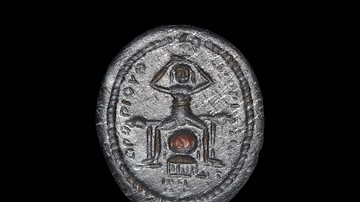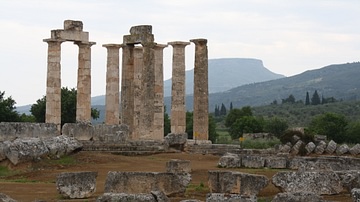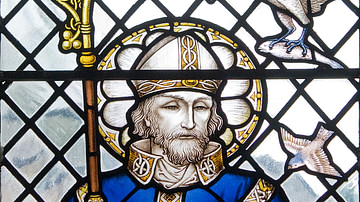Search
Did you mean: Cyrene?
Search Results

Definition
Coyolxauhqui
Coyolxauhqui (pron. Koy-ol-shauw-kee) was the Aztec goddess of the Moon or Milky Way who was famously butchered by her brother Huitzilopochtli, the god of war, in Aztec mythology. This story was commemorated in a celebrated large relief stone...

Definition
Nara Period
The Nara Period (Nara Jidai) of ancient Japan (710-794 CE), so called because for most of that time the capital was located at Nara, then known as Heijokyo, was a short period of transition prior to the significant Heian Period. Despite the...

Definition
Saxon Wars
The Saxon Wars (772-804) were a series of conflicts between the Franks under Charlemagne, who sought to conquer Saxony and convert the populace to Christianity, and the Saxons who resisted. The conflict lasted over 30 years through 18 campaigns...

Definition
Cynisca of Sparta
Cynisca of Sparta (b. c. 440 BCE) was a Spartan royal princess who became the first female Olympic champion. Defying the traditional role of women in ancient Greece, she competed in the Olympic Games alongside the men and won. Her triumph...

Definition
Eileithyia
Eileithyia (or Ilithyia) was the goddess of childbirth in Greek mythology, with the power to either help or hinder childbirth. She most famously played a role in the birth of Hercules and Apollo. Eileithyia was the daughter of Zeus and Hera...

Definition
Walpurgis Night
Walpurgis Night (30 April, annually) is a modern-day European and Scandinavian festival derived from the merging of the ancient pagan celebration of Beltane with the commemoration of the canonization of the Christian Saint Walpurga (l. c...

Definition
Ancient Nara
Nara, located around 30 km south of modern Kyoto, was the capital of ancient Japan between 710 and 784 CE. It gave its name to the Nara Period (710-794 CE), although the name during the 8th century CE was Heijokyo. Modelled on the Chinese...

Definition
Nemea
Nemea was a religious sanctuary in the northern Peloponnese of Greece where pan-Hellenic athletic games were held every two years from 573 BCE until 271 BCE, after which, the Games were definitively moved to Argos. Early Settlement Situated...

Definition
Saint Cuthbert
Saint Cuthbert (c. 634 - 20 March 687) was an Anglo-Saxon monk from the Kingdom of Northumbria, who became the bishop of Lindisfarne and one of the most important saints of the medieval church in England. He first became a monk at Melrose...

Definition
Khajuraho
Khajuraho was an ancient city in the Madhya Pradesh region of northern India. From the 10th to 12th century CE it was the capital of the Chandella kings who ruled Bundelkhand. Despite Khajuraho's once great reputation as an important cultural...